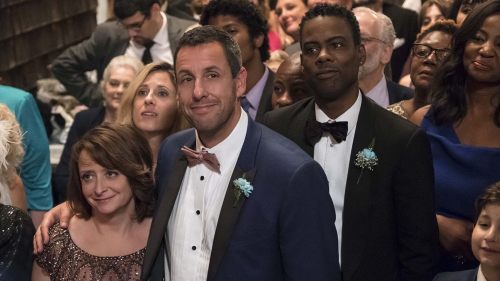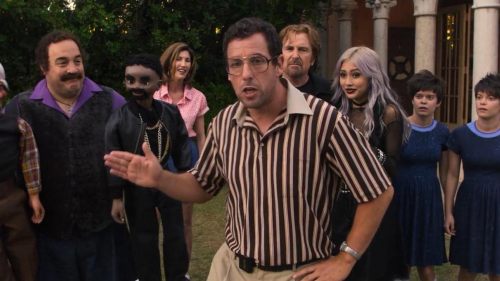This Is Your Life: Adam Sandler And FUNNY PEOPLE
The Big Sick is opening wide soon. Get your tickets here!
“You’re excited. It’s good to be excited. I used to be excited.”
It’s tough to say exactly when Adam Sandler stopped being a funny person. Comedy fans of a certain generation (that sweet overlap between X and Millennial) were partially raised on the guy’s bizarre tapes – a cartoonish mix of juvenile violence peppered in amidst tunes about lunch ladies and Chanukah. His impish SNL characters – like Canteen Boy, who gets molested by Alec Baldwin’s lecherous Scout troupe leader – were highlights during the years when Chris Farley lived in a van down by the river, and Tim Meadows’ Ladies’ Man wanted to have sex with you and film it. Billy Madison (’95), Happy Gilmore (’96), and The Waterboy (’98) were screeching stoner delights, while The Wedding Singer (’98) proved there was a beating human heart beneath Sandler’s obnoxious Brooklyn-born and bred abrasiveness. To wit, he wasn’t always Sandy Wexler.
Just when the comedian’s volatile man-child persona seemed to run out of gas with the truly atrocious Little Nicky (’00), Paul Thomas Anderson subverted our perception of Sandler (at least, up to that point in his career) with Punch Drunk Love (’02). An art film masquerading as a romantic comedy, PTA tapped into a level of pathos most didn’t think Sandler was capable of, as the electric blue-suited Barry Egan becomes a complex study of manic states; a character who comes this close to tipping over the edge of sanity until Emily Watson’s equally strange angel rescues him from a pit of despair and loneliness. Punch Drunk Love still stands as the most experimental motion picture in a filmography that includes adapting Thomas Pynchon in 70mm, and is often utilized as Defense Exhibit A whenever slagging on Sandler’s career starts.
Sadly, Punch Drunk Love wasn’t a turning point, but rather an anomaly for Sandler, who immediately returned to his insufferable formula with Anger Management (’03). There’d be moments where it felt like the funny man was straining against himself – James L. Brooks’ Spanglish (’04) and Mike Binder’s Reign Over Me (’07) being the most notable instances of his detours from shtick – but filmic abominations like Click (’07) and Bedtime Stories (’08) proved to be much more of an indicator where Sandler’s career was truly headed. Now, he seems content to phone in a piece of junk once a year from Hawaii, where he gathers his friends and fellow movie stars together to shoot forgettable tripe (such as rom coms like Just Go With It [‘11])and collect their paychecks. Truth be told, it’s not such a bad gig when you lay it out on paper, but his short-lived days of promise have been tossed into the ocean along with any outward desire to make genuine art. But who gives a shit if critics hate your movies when your entire life’s a paid vacation?
Perhaps his final descent into the Netflix abyss (the streaming megaservice inked a deal with Sandler to finance and distribute eight pictures) is what renders Judd Apatow’s Funny People (’09) such a deft work of existential self-examination. After all, who better to put Sandler’s career crisis under the microscope than his pre-fame roommate? Back before either hit the big time, Sandler and Apatow shared a $900/month apartment, where they’d sleep until noon, write jokes for the rest of the day, then go to “work” at 8:30 every night, spitting new material into an open mic for ten minutes. The narrative of Funny People sees two examinations of Sandler happening concurrently, as Seth Rogen (fresh off success with Apatow on Knocked Up [‘07]) plays a younger version of the comedian, while Sandler portrays his burned out current self under the pseudonym George Simmons. Were it not for the superfluous relationship elements that take up the movie’s back stretch, Funny People would be a stone metatextual masterpiece – a supernaturally-stripped Christmas Carol of comedy, in which a man gets to stare into the past and see what could’ve been, all while facing his grim future head on.
The first eighty minutes of Funny People may be the very best in Apatow’s filmography. Ira (Rogen) is a starry-eyed kid working the stand-up scene in LA. manning shifts at a deli before doing sets at the Improv. He’s a struggling nobody until Simmons hires him as a personal assistant of sorts, going beyond the initial jokes he’s asked to write for a MySpace gig, and into a confidant the superstar can still feel superior to. Rogen beams during every moment he gets to play a scene with Sandler – going full puppy dog just looking for approval. The earnestness he injects into Apatow’s already semi-autobiographical material comes incredibly close to tipping over into schmaltz, but Rogen manages to retain a sense of reality throughout his garbled stoner delivery. At first, Ira seems just as likely to trip over one of Simmons’ numerous dick jokes (note: there are so many dick jokes) as he is to provide five minutes of solid material as a warm up act. Yet this odd relationship teaches Ira to assert himself, even if that means one of his boyhood idols will castigate him for it.
Though he’s pretty much playing himself (with a heavy dose of Eddie Murphy tossed in for good measure), Sandler delivers the second most surprising performance of his spotty career. Simmons is a washed-up hack, mostly famous for the bizarrely juvenile concepts behind his movies (such as transforming into a baby in Re-Do or playing a Merman) that have made him appear to be the mother of all sell outs. He is – living in a lavish mansion, equipped with a full-service staff, George is a long way from being the weird Jewish kid who goofed on his bar mitzvah suit during a short Tonight Show showcase. Simmons is the king of an empire – but he knows it’s all made of bullshit. This has made him virulently bitter; the bags under Sandler’s eyes emphasized to demonstrate just how tired this life of riches has made him. In his head, true happiness can only be achieved with the proverbial “one that got away” – his true love (Leslie Mann) who now lives with her kids (played by Apatow’s real-life daughters) and philandering yet good-natured husband (Eric Bana).
Two-thirds of Funny People play like a perfect approximation of an artist whose creative drive was jettisoned long ago in favor of marinating in fame. Sure, Simmons’ arc is slightly corny and predictable, but watching Sandler interact with Rogen (not to mention Apatow regulars like Jonah Hill, who plays one of Ira’s roommates) reveals a dull spark still left in his big brown eyes. Adam Sandler was Seth Rogen and Jonah Hill not too long ago, and his R-rated back and forth with this new generation is rather inspired, while being nestled into another contextual fold regarding the evolution of modern comedy as a whole. Ira’s other roommate is in a Chuck Lorre-style NBC ass sandwich sitcom Yo, Teach!, while the hottest gig down at the open mic is Randy (Aziz Ansari) – a hyper-animated Dane Cook knock-off that Ansari dubbed “the Soldier Boy of stand up.” Apatow knows this landscape and these people so well that it all comes off remarkably lived-in and alive, while slipping some venomous shots at the type of tripe that succeeded while his multiple attempts at crafting network TV won over critics, but were ultimately cancelled.
Unfortunately, the last third of Funny People becomes a beautiful slog, as regular Spielberg cinematographer Janusz Kaminski (Schindler’s List) captures each scene with a sunny slickness. Simmons attempts to convince his lost love that he’s still the only one for her, resulting in a near cataclysmic destruction of the family she’s built. It’s a dry run for the middle-aged existentialism that would drive This is 40 (’12). The only thing that’s missing is Paul Rudd. Simmons’ diagnosis with a potentially fatal blood disease leads to a detour from the reflexive interrogations the movie raises within its first and half of its second act, as George decides it’s time to try and reclaim happiness that isn’t rightfully his. Apatow desperately strains to make the James L. Brooks comedy he’s always wanted to craft, but the mechanizations of his plot clash with everything that comes before, resulting in two movies, the second of which just isn’t that interesting. One could read Simmons’ potential conquest as an overarching comment on comedians as a whole, playing into the adage that they’re really miserable on the inside, but the hyper-specificity of everything else renders even that subtext rote and forced as well.
Funny People owns an air of melancholy that’s heightened when revisiting it nearly ten years after its initial release. What could’ve been a major turning point for Sandler was only a momentary pause before picking up right where he left off, pushing his bizarre onscreen antics to their breaking point with unwatchable nonsense like the Grown Ups duology (‘10/’13) and Pixels (’15). We’re never going to get back the dude who savagely beat up a high school janitor, nor is PTA going to swoop in with a surprise project that’ll make us reevaluate the former SNL all-star. Truth be told, it’s our fault that this monster exists. A 2012 survey of Redbox rentals found that three of their top ten all-time selections were amongst Sandler’s very worst. Not only is the former funny man making bad movies, a good section of the public is encouraging his crass behavior. So why would he stop? Funny People flopped at the box office, and Punch Drunk Love is beloved by a niche group of cinephiles. Maybe Sandler quit experimenting beyond his usual shtick because he’s always been a crowd-pleaser at heart, and the dollar signs he so readily admits to chasing weren’t there when tried to make actual art. The goal of a comedian is to make us laugh, and when Sandler started getting introspective, all that filled the club was dead silence and mic feedback. Those are sounds no funny person wants to hear.



